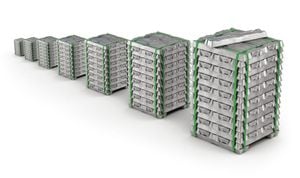The 2025 Bundestag elections held on February 23 saw Berlin's political distribution radically shift, culminating with the CDU (Christian Democratic Union) capturing 28.5% of the votes, marking them as the leading party of this election, according to projections by the ARD. Following closely behind was the far-right AfD (Alternative for Germany), which achieved 20.6%, nearly doubling their previous numbers from 2021. Meanwhile, the historically dominant SPD (Social Democratic Party) plunged to 16.5%, suffering unprecedented losses, starkly reflecting voter dissatisfaction with their leadership.
Overall, voter turnout was impressively high, reaching about 84%, the highest since the reunification of Germany, showcasing the electorate's engagement with what many viewed as pivotal issues facing the nation. The influx of voters was well noted, contrasting the previous 2021 election turnout.
Surprisingly, the Left party recorded significant gains, with figures indicating their share could reach 8.7%, alongside the Greens at 11.8%. These results signal potential shifts as Berlin voters increasingly lean toward traditionally marginalized parties, primarily the Left, who have strengthened their foothold throughout the city.
The night of the election was charged with excitement, particularly for figures like Gregor Gysi, who celebrated substantial wins including his anticipated title as "Alterspräsident" or the oldest member of the Bundestag. Gysi, representing the Left, remarked on the joyful turnout at his party’s celebration, which felt particularly salient after years of political strife. He shared with supporters, "It’s not just about age; it’s about seniority, and I have achieved this against all odds." Gysi’s victory stood as symbolic, highlighting the Left's revival after years of challenges.
But it wasn't all jubilance on the night; the mood was starkly somber for many within the SPD ranks. Local leader Nicola Böcker-Giannini called the results "a hard blow and wake-up call for the SPD," emphasizing the need for the party to reevaluate its strategies moving forward. With such low numbers, leaders recognized the urgency to address the drift away from traditional support bases, particularly among younger voters.
Simultaneously, conversations were rife within CDU ranks of what this election means for the future of the party. Although their results were promising, leaders like Berlin's Regierender Bürgermeister (Governor) Kai Wegner acknowledged it was only the beginning of hard conversations about forming future coalitions potentially with the AfD, noting residents expressed increased interest toward conservative policies like border security and economic reform.
A local analysis of district voting patterns revealed disparities; for example, the Left party dominated traditionally progressive areas such as Neukölln where Ferat Koçak led the charge with over 30% of the votes, whereas the CDU found strongholds in areas like Steglitz-Zehlendorf, enjoying upward trends compared to previous elections.
Meanwhile, the SPD saw defeats across various races. Notably, their former leader Michael Müller risked losing his direct mandate, coming up short to CDU’s Lukas Krieger. Reports across all districts suggested discontent with the SPD leadership’s decisions over previous election cycles may have contributed heavily to the voting outcomes.
Even though the Berlin election had its unique results, trends reflected broader sentiments across Brandenburg as well. Here the AfD emerged victoriously with 32.5% of votes and major victories across many districts, solidifying their presence and raising concerns among traditional party leaders about the potential for future coalitions.
The fallout from the election results suggests complex political negotiations on the horizon, with the CDU's Friedrich Merz under heightened scrutiny as he begins to shape potential alliances. "The electorate has decisively spoken, and building governance from this outcome will not be straightforward," Wegner noted, foreshadowing potential rocky political landscapes to navigate.
Activist groups began organizing demonstrations following the results, galvanized by fears of rising right-wing sentiments along with calls for amplified climate actions. Many voiced frustration at mainstream parties for failing to adequately prioritize environmental issues within their platforms during the election campaign.
Overall, the 2025 Bundestag elections were not simply another electoral exercise but rather served to test the pulse of modern German society which is grappling with identities, policies, and the future direction of governance. With responses from parties on all sides shifting as they reassess their bases, the path to the next elections is bound to be fraught with changes and renewed challenges.



